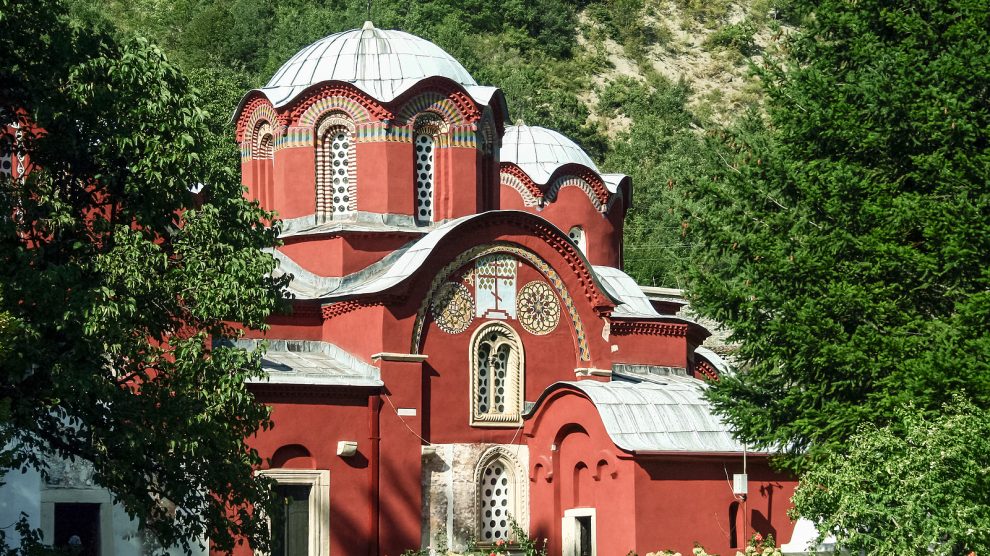Relations between Serbia and Kosovo late last year reached their lowest ebb in more than a decade, but there were signs this week that the pair might be ready to begin talking again.
One of the biggest stumbling blocks on Serbia’s road to the European Union has long been its failure to normalise relations with Kosovo. Belgrade knows that EU membership will not happen unless it finds some way of accepting the independence of its former province.
Both countries have applied to be EU members. Serbia first made its bid for membership in 2009 and received candidate status in 2012. Kosovo only submitted its application in December last year and has yet to be accepted as a candidate.
- In northern Kosovo, conflict is avoided, for now
- Kosovo’s eternal asterisk
- For the Western Balkans, the EU’s mixed messaging continues
While the EU has made it clear that normalised relations between the two countries are a pre-condition for either joining, little progress has been made towards an agreement. Indeed, last year saw the most serious escalation in tensions between the pair for some time.
Problems began during the summer amid anger among ethnic Serbs in northern Kosovo at new laws requiring them to exchange their Serb-issued documents (such as license plates and ID cards) for the Kosovan equivalent. A series of brief stand-offs on roads leading to Kosovo from Serbia ensued, ended only by EU and US calls for de-escalation.
In November, the arrest of an ethnic Serb former policeman in northern Kosovo prompted protestors to once again block roads – this time for several weeks. Serbia’s Defence Minister Miloš Vučević at one stage said the country’s army was at its “highest level of combat readiness”, but after the former policeman was released from Kosovan custody, protestors removed their blockades.
‘Serbia cannot remain isolated’
Ironically, despite the two countries only a couple of months ago coming so close to armed conflict for the first time in many years, there were signs this week that Serbia’s president, Aleksandar Vučić, might finally be ready to begin the process of normalisation with Kosovo.
Envoys from the EU, France, Germany, Italy, and US have all recently met with Vučić to discuss a draft agreement for the normalisation of Serbia-Kosovo relations. On Monday, during a televised news conference, Vučić summarised what they had been telling him.
“[They] told me – you must accept this plan, or you will face the interruption of the process of European integration, the halting and withdrawal of investments and comprehensive economic and political measures that will cause great damage to the Republic of Serbia”, Vučić said. “It would be a matter of weeks before the visa-free regime we have with the European Union would be abolished.”
Then came the suggestion that Vučić was not ready to abandon its EU hopes: “Serbia must remain on its EU path, because we would be lost without it, economically and politically. If we were to be alone and isolated, that is not something I would accept as a president,” he said.
The plan Vučić refers to has yet to be made public (at least officially), although a document purporting to be a draft normalisation agreement was leaked to the media in November. It closely follows the framework of the 1972 Basic Treaty, which allowed East and West Germany to de facto recognise each other, establish “permanent missions” to each other in place of official embassies, and create a path for both to join the UN.
The leaked Kosovo-Serbia normalisation agreement calls for the two countries to establish “normal, good neighbourly relations with each other based on equal rights” and permanent missions to the other. Both countries would recognise that they will not “represent the other in the international sphere nor act on its behalf”, and Serbia would cease efforts to block Kosovo from joining international organisations, including the UN.
“Advancing on this proposal would bring considerable benefit for both sides,” Josep Borrell, the EU’s foreign policy chief, told reporters this week. “I consider that this is the only way to break the vicious cycle of crisis on the ground and to reduce the risk for further escalation.”

‘Expedited EU accession’
The leaked proposal consists of 10 short points but includes the establishment of an Association of Serb Municipalities in north Kosovo, assurances that Kosovo will protect historical churches and monasteries that Serbia considers as its heritage, and – perhaps most importantly – expedited entry into the EU for Serbia.
Counselor of the US Department of State Derek Chollet tweeted on Tuesday that he had discussed the creation of an Association of Serb Municipalities and the return of Serb government employees to work in Kosovo’s northern region with Kosovan Prime Minister Albin Kurti as part of a dialogue with Serbia.
Kurti has yet to publicly support the creation of the Association and recently said, “Our constitution is incompatible with the establishment of an ethnic unit because the essence of the constitution of Kosovo is the multi-ethnic structure of the state”.
Kosovo’s Foreign Minister Donika Gervalla says that the leaked proposal is just “a basis for discussion”.
There may still be a lack of clarity over what shape a final Kosovo-Serbia normalisation agreement may take, but Vučić’s comments this week indicate that he may this time view the costs of refusing to go along with it as far too great.
It remains to be seen if Kurti – for whom the stakes are not currently quite so high – will be ready to play along.
Unlike many news and information platforms, Emerging Europe is free to read, and always will be. There is no paywall here. We are independent, not affiliated with nor representing any political party or business organisation. We want the very best for emerging Europe, nothing more, nothing less. Your support will help us continue to spread the word about this amazing region.
You can contribute here. Thank you.







Add Comment